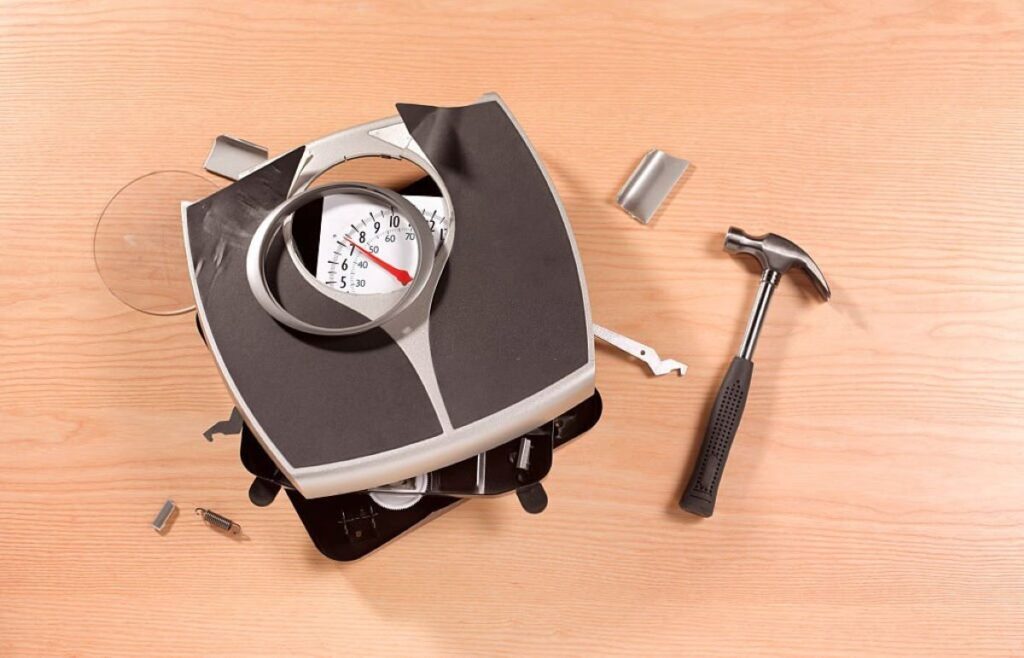Recently I am hearing the buzz “I Need To Lose Weight Fast, I Don’t Care How” a lot. Seems like people are seeing fast outcomes without thinking about the consequences.
Quick weight loss, often sought after for the allure of immediate results, has pervaded our wellness-driven society. Whether it’s extreme diets, exhaustive exercise regimens, or dubious pills, the mantra ‘the faster, the better’ seems to echo everywhere.
But have you ever paused to consider what such quick weight loss might be doing to your health?
This blog post unravels the less-talked-about aspects of rapid weight loss, shedding light on its impact on physical and mental health.
We will delve into the repercussions of nutrient deficiencies, muscle loss, anxiety, depression, and even more severe mental health disorders stemming from an unhealthy relationship with weight loss.
By exploring the implications of this ‘quick fix’ approach to weight loss, we aim to underscore the importance of sustainability and health in your weight management journey.
The “I Need To Lose Weight Fast I Don’t Care How” Mindset
The initial step toward embracing a healthier weight-loss approach is to recognize the elements contributing to this desperate attitude and its potential hazards.
Can creatine be the partner in your weight loss journey?
By diverting attention from speedy weight loss to overall health, you can begin to make wiser, healthier choices that lead to enduring results.
Social Influence and Hasty Weight Loss
The urge for swift weight loss has become a common trend in a world where quick results are often preferred. The pressure to align with ideal body images and unrealistic beauty standards, amplified by social media, celebrities, and peer influences, can be significant.
This pressure often compels individuals to embrace an “I Need To Lose Weight Fast I Don’t Care How” attitude. Aspiring speedy results can often eclipse potential adverse effects, leading many to opt for damaging shortcuts instead of healthy and lasting weight loss methods.
Implications of the Weight Loss Attitude
While this attitude may appear resolute and goal-driven, it can threaten physical and mental wellbeing. When the concentration is merely on the digits on the scale instead of overall health and wellness, it can trigger a cycle of extreme diets, over-exercising, and possibly even disordered eating patterns.
The need to lose weight promptly often overlooks the significance of nutritional equilibrium, moderation in exercise, and the reality that sustainable and healthy weight loss requires time.
Physical Consequences of Rapid Weight Loss
While losing weight quickly may seem appealing, the physical consequences can be severe and long-lasting.
The key is to focus on sustainable methods that ensure you’re losing weight healthily, preserving your muscle mass, maintaining a well-functioning metabolism, and nourishing your body adequately.
Malnutrition and Nutrient Deficiencies
A primary risk associated with quick weight loss is malnutrition and nutrient deficiencies. People often resort to extreme calorie restriction or elimination of entire food groups, resulting in the body lacking the essential nutrients for optimal function. This can lead to
- Fatigue
- Dizziness
- Hair loss
- Weakened immunity
Muscle Loss
When the body doesn’t get enough calories, it starts using its energy stores, including fat and muscle tissue. While the goal of weight loss is to lose fat, rapid weight loss often leads to loss of muscle mass. This can result in weakness and could potentially slow down your metabolism, making it harder to maintain weight loss or lose weight in the future.
Impact on Metabolism
Quick weight loss can also have a significant impact on your metabolism. When you severely restrict your calorie intake, your body goes into ‘starvation mode,’ slowing your metabolism to conserve energy. Due to this slower metabolism, you’ll likely gain weight quickly once you resume regular eating habits.

Adverse Effects on Digestive Health
Extreme weight loss strategies can harm your digestive system as well. Sudden and drastic changes in dietary habits can lead to constipation, diarrhea, and other digestive problems.
Weakened Immune System
Lastly, quick weight loss can weaken your immune system, making you more susceptible to illnesses. The lack of nutrients can interfere with the body’s ability to fight infections and disease, leading to an increased risk of falling ill.
Mental Health Implications of Quick Weight Loss
The mental health implications of rapid weight loss are just as severe as the physical consequences, if not more so. It’s critical to approach weight loss with a mindset of overall health and wellbeing rather than focusing solely on the speed of weight loss.
Proper nutritional intake, regular exercise, and a positive body image are all crucial components of a healthy weight loss journey.
Anxiety and Depression
Rapid weight loss can have serious implications for mental health. An overwhelming preoccupation with weight and diet can increase stress and anxiety. In some cases, the fear of gaining weight back can be a source of constant worry, leading to anxiety disorders. Additionally, malnutrition from extreme dieting can affect brain function, potentially leading to symptoms of depression.

Eating Disorders
The ‘I need to lose weight fast, I don’t care how’ mentality is often associated with the development of eating disorders such as anorexia, bulimia, or binge-eating disorder. These severe conditions have significant physical and mental health consequences and require professional treatment.
Body Dysmorphia
Body dysmorphia, a psychological disorder where a person obsesses over perceived flaws in their appearance, is another potential consequence of the rapid weight loss mindset. Individuals may continue to perceive themselves as overweight or flawed, even when they have lost significant weight.
Social Isolation
The obsession with losing weight quickly can also lead to social isolation. Some people may avoid social situations involving food or cancel plans to stick to rigorous exercise or eating routines. This isolation can contribute to feelings of loneliness, further exacerbating mental health issues.
Promoting a Healthier Approach to Weight Loss
The journey to weight loss is personal, and there’s no one-size-fits-all approach. It’s about creating a healthier lifestyle you can maintain in the long run rather than seeking quick fixes.
A number on the scale does not determine your worth. Focus on feeling healthy and strong, not just looking a certain way.
Establish Realistic Goals
Setting realistic and achievable goals is one of the first steps toward healthy weight loss. Losing 1-2 pounds per week is considered healthy and sustainable. Understand that everyone’s body responds differently to diet and exercise and that patience is vital.
Balance Your Diet
Instead of eliminating entire food groups, focus on creating a balanced diet. Incorporate lean proteins, whole grains, fruits, vegetables, healthy fats, and vegan proteins. Remember, the goal is to nourish your body, not deprive it.
Exercise Regularly
Regular physical activity plays an essential role in weight loss and maintenance. Find a routine you enjoy to ensure consistency. It could be anything from walking or cycling to weight lifting or yoga.
Listen to Your Body
It’s vital to listen to your body’s hunger and fullness cues. Eating when you’re hungry and stopping when you’re satisfied can help you avoid overeating and maintain a healthy relationship with food.
Seek Professional Guidance
Consulting with a registered dietitian or a professional fitness trainer can provide personalized guidance based on your health needs, lifestyle, and preferences.
Mental Health Matters
Don’t neglect your mental health in your weight loss journey. If you’re feeling overwhelmed, consider seeking help from a mental health professional. Mindfulness practices and positive affirmations can help maintain a positive self-image and relieve stress.
However, sometimes too much exercise and supplements can make you feel a bit numb if you have some preconditions.
Understanding Sustainable Weight Loss
Sustainable weight loss refers to the healthy, gradual shedding of pounds over a prolonged period. Typically, a rate of one to two pounds per week is considered healthy and sustainable.
This weight-loss approach encourages long-term lifestyle changes rather than quick fixes and helps ensure that the weight stays off.
The Role of Balanced Nutrition
A cornerstone of sustainable weight management is a balanced diet. Consuming various nutrient-dense foods from all food groups ensures you are fueling your body adequately while maintaining a calorie deficit necessary for weight loss. Starvation diets or eliminating entire food groups are unsustainable and can lead to nutritional deficiencies.
Check these creatine alternatives that can help you rebuild lost muscles and enhance performance.
The Power of Regular Exercise
Physical activity is crucial for sustainable weight management. Regular exercise, be it cardio, strength training, or flexibility workouts, helps burn calories, boost metabolism, and build muscle, contributing to effective and sustainable weight loss.

Mental Wellbeing and Weight Management
Sustainable weight management also addresses mental health. Developing a healthy relationship with food, exercising for enjoyment and health (rather than punishment), and cultivating body positivity is key.
Can Zinc and Selenium boost weight management?
Mental wellbeing can directly affect eating and exercise habits, so taking care of your mental health is as important as physical health in weight management.
Consistency Over Perfection
An essential part of sustainable weight management is understanding that progress won’t always be linear. There will be setbacks and plateaus, but what matters is consistency. It’s about making healthier choices more often than not, even if it’s not perfect every day.
Healthcare Professional Guidance
Consulting with a registered dietitian, a professional fitness trainer, or a healthcare provider can be highly beneficial. These professionals can provide individualized guidance, taking into account personal health status, lifestyle, preferences, and goals.
Conclusion
The need for swift weight loss can be compelling, but the quest for fast results can lead down a dangerous path.
“I Need To Lose Weight Fast I Don’t Care How,” such quick-fix solutions often neglect overall health and may cause more harm than good. Sustainable weight loss, on the other hand, is a balanced, patient process that combines healthy eating, regular exercise, and a positive mindset. It might be slower, but the long-term outcomes promote holistic wellness.
It’s not just about shedding pounds—it’s about nurturing a healthier version of yourself, mentally and physically. Always consult a healthcare professional before embarking on any weight loss journey or dietary supplement.

I started my professional career as a sports medicine consultant in Rola, Missouri. My primary role was to suggest suitable supplements for my patients according to their pre-existing conditions and lifestyle goals. I believe a healthy lifestyle is the most important if you want to make your life really meaningfull.


